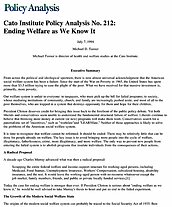From across the political and ideological spectrum, there is now almost universal acknowledgment that the American social welfare system has been a failure. Since the start of the War on Poverty in 1965, the United States has spent more than $3.5 trillion trying to ease the plight of the poor. What we have received for that massive investment is, primarily, more poverty.
Our welfare system is unfair to everyone: to taxpayers, who must pick up the bill for failed programs; to society, whose mediating institutions of community, church, and family are increasingly pushed aside; and most of all to the poor themselves, who are trapped in a system that destroys opporunity for them and hope for their children.
President Clinton deserves credit for bringing this issue back to the forefront of the public policy debate. Yet both liberals and conservatives seem unable to understand the fundamental structural failure of welfare. Liberals continue to believe that throwing more money at current (or new) programs will make them work. Conservatives search for a paternalistic set of “incentives,” such as “workfare“and “LEARNfare.” Neither of those approaches is likely to solve the problems of the American social welfare system.
It is time to recognize that welfare cannot be reformed. It should be ended. There may be relatively little that can be done for people already on welfare. The key issue is to avoid bringing more people into the cycle of welfare, illegitimacy, fatherlessness, crime, more illegitimacy, and more welfare. The only way to prevent new people from entering the failed system is to abolish programs that insulate individuals from the consequences of their actions.

This work is licensed under a Creative Commons Attribution-NonCommercial-ShareAlike 4.0 International License.

